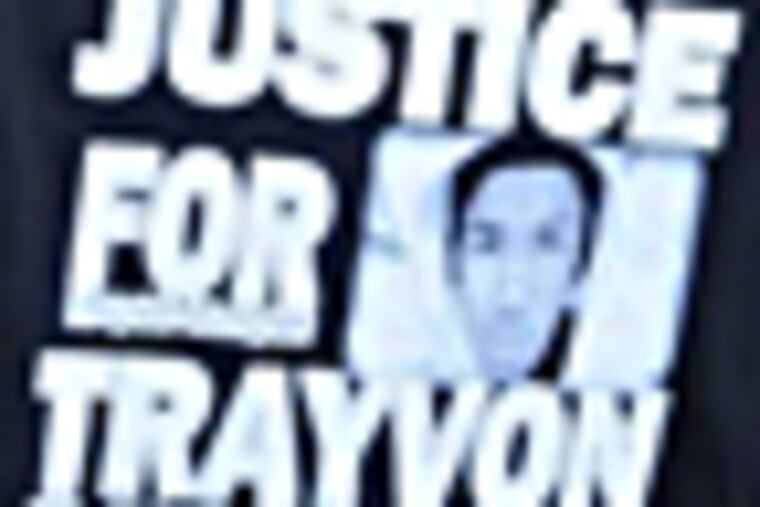Letters to the Editor
Not OK to print drivel It is OK that George Parry wants to hypothesize about how Trayvon Martin was justifiably shot (“More questions in Fla. shooting,” Sunday). It’s OK that many people seem to feel, as Parry apparently does, that some liberal-media-elitist conspiracy hysterically overstates the case of an unarmed minor shot by an armed adult. And finally, it’s OK — and, frankly, understandable — that the newspapers have a desperate urgency to appeal to every subscription-paying constituency in an age in which journalism is losing its lifeline. But it is not OK that this trifecta of wild surmise, racism, and desperation means that the best “my” newspaper can do is print low-quality, intellectually offensive drivel.

Not OK to print drivel
It is OK that George Parry wants to hypothesize about how Trayvon Martin was justifiably shot ("More questions in Fla. shooting," Sunday). It's OK that many people seem to feel, as Parry apparently does, that some liberal-media-elitist conspiracy hysterically overstates the case of an unarmed minor shot by an armed adult. And finally, it's OK — and, frankly, understandable — that the newspapers have a desperate urgency to appeal to every subscription-paying constituency in an age in which journalism is losing its lifeline. But it is not OK that this trifecta of wild surmise, racism, and desperation means that the best "my" newspaper can do is print low-quality, intellectually offensive drivel.
Jack Bellis, Wyndmoor
A rush to judgment
As new information is emerging about the shooting of Trayvon Martin, we are receiving an object lesson in the danger of a rush to judgment with regard to this type of incident. In the way the media initially reported the incident, they made it appear to be a killing that was totally without provocation and was racially motivated, neither of which had been established as fact. By giving a slanted and incomplete account of this incident, the media, in essence, were convicting George Zimmerman before the truth was known. In doing so, the media led most Americans, myself included, to judge the man guilty. There is still much to be disclosed before the guilt or innocence of Zimmerman will be determined, and we all need to await the trial for the truth to be revealed.
William Cooney, Philadelphia
Charters the only hope for many
A moratorium on city charter schools, as proposed by Jerry T. Jordan, president of the Philadelphia Federation of Teachers, would be a tragedy ("Charter expansion threatens Pa. schools," April 25). Charters are the only hope for many of the kids trapped in Philly's failing and violent schools.
In fact, with nearly 41,000 students, charter schools save Philadelphians more than $200 million a year — about $5,000 per student. That's because Pennsylvania charter schools spend, on average, only 83 percent of what school districts spend per student. At cyber-charters, their per-student cost is just 76 percent of what public schools spend. In other words, traditional public schools retain funding even as they have to educate fewer children.
Also missing from Jordan's op-ed is the purpose for reserve funds at charter schools, which are necessary because charters often fight for months with school districts to receive student funding.
Taxpayer funds for public education belong to children, not school districts, and should follow students wherever they choose to be educated. The question is not how to cap charter enrollment, but why so many children are fleeing to schools of choice.
Priya Abraham, senior policy analyst, Commonwealth Foundation for Public Policy Alternatives, Harrisburg
Delta doesn't need state money
It's great that Delta Air Lines has decided to purchase the oil refinery in Trainer ("Delta to buy oil site from ConocoPhillips," Tuesday). However, did the airline really need $30 million from the state to close the deal? The answer may be a rather emphatic no, since Delta already has tremendous resources and plans to spend $100 million more to refurbish the plant to increase its output of jet fuel. Also, Delta plans to complete the acquisition by mid-year, and jet-fuel production will begin by the end of October. Since there are hundreds of former refinery workers available, what need does Delta have for state money for infrastructure and job creation? Even without the $30 million sweetener, Delta could not turn down such an opportunity to become a supplier of an item that makes up 40 percent of its costs.
Should we ask Gov. Corbett to request a refund of even just half so that some priority needs, such as schools, colleges, health care, food programs, crime prevention, or community projects, are given a little more attention?
Edwin E. Scully, Philadelphia, edwinscully@verizon.net